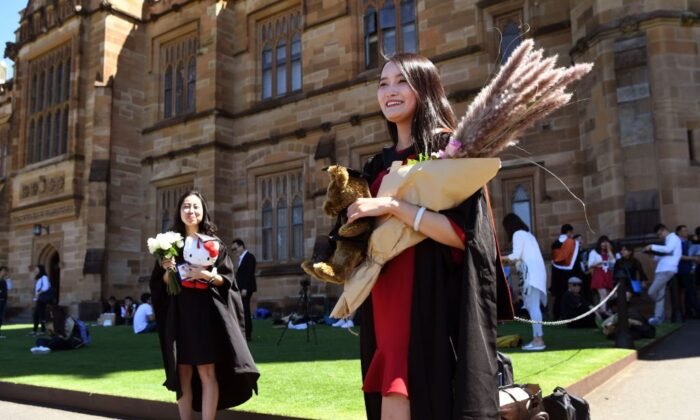Higher Education Body Credits International Students for Preventing Australian Recession
Universities Australia is warning that new legislation could have negative impacts on the international education sector.
The peak higher education body in Australia has emphasized the crucial role played by the international education sector in preventing the country from facing a recession last year.
Currently, the Labor government is proposing new legislation to limit the number of overseas students each Australian higher education institution can accept each year. The aim is to enhance the quality and integrity of the sector.
Concerns have been raised by stakeholders that this legislation could potentially harm the industry’s reputation and have adverse effects on education providers, employment opportunities, and international students.
During a Senate inquiry hearing on Aug. 6, the CEO of Universities Australia, Luke Sheehy, highlighted the significant contribution of the international education sector to Australia’s economy.
He stated, “International students contributed to more than half of Australia’s GDP growth last year, essentially preventing the country from slipping into a recession.”
Sheehy added, “The sector is Australia’s second biggest export after mining, generating nearly $50 billion (US$32.6 billion) for the economy and supporting approximately 250,000 jobs.”
Nevertheless, the CEO acknowledged that despite its economic importance, the sector has been unfairly treated. He mentioned that even before the introduction of the new legislation, the government had taken a harsh approach towards international education.
Sheehy highlighted, “Data from the Department of Home Affairs indicates a 23% decrease in visa grants to higher education in the past year, equivalent to 59,410 university students affected.”
He explained, “This decline can largely be attributed to Ministerial Determination 107, which was implemented in December, resulting in a drastic slowdown in visa processing and a surge in visa cancellations for many universities.”
According to Sheehy, the 60,000 drop in international enrollments resulted in a $4.3 billion loss to the economy and could lead to over 14,000 job losses.
He further noted that this impact extends to small businesses that rely on international students for their livelihood.
Universities Australia Criticizes New Bill as ‘Political Smoke Screen’
The CEO also criticized the new bill, labeling it as a political tactic by the government to gain an advantage in the migration debate against the Opposition before the upcoming federal election.
He expressed, “We perceive the bill as more of a political distraction than a tool for effective policy.”
Sheehy pointed out that the bill grants unprecedented powers to the education minister to exert control over the industry.
Additionally, he mentioned that the bill is being used to shift blame for the housing crisis onto international students.
He stated, “Our primary concern lies with the provisions that aim to restrict the number of international students that universities can enroll and the courses they can undertake. This level of ministerial control is unprecedented.”
“Both major political parties are linking the return of international students post-pandemic, whom they encouraged back, to Australia’s housing shortage,” added Sheehy.
The number of international students starting their studies also reached a record high (259,057) in the year up to April 2024.
This significant growth in international students coincided with the government’s struggles to manage the flow of migration into Australia.
Sheehy emphasized, “No other major export industry is facing the same treatment as international education right now. Neither mining, agriculture, nor tourism are being dealt with in this manner.”
“We need to question whether this crucial industry is valued less than the political gains sought by the government on election day.”
Home Affairs Department Expresses Concerns about Integrity
Meanwhile, Tara Cavanagh, a group manager at the Home Affairs Department, raised integrity concerns within the sector during the hearing.
She expressed, “There is evidence of exploitation of international students and individuals within the sector who aim to exploit Australia’s migration and education systems for purposes other than genuine study.”
“This exploitation ranges from providing substandard educational services to charging exorbitant fees and making false promises about pathways to permanent migration,” Cavanagh mentioned.
Additionally, she pointed out that severe crimes like sex trafficking, bonded labor, and slavery were linked to such exploitative activities. The funds gained from these illegal practices support criminal networks both inside and outside Australia.
“The data on student visa applications indicates an increase in integrity concerns, with the number of applications rising from 360,000 annually to 590,000,” Cavanagh explained.
Cavanagh stressed the importance of maintaining Australia’s education sector’s competitiveness on a global scale while upholding high standards of immigration integrity.






